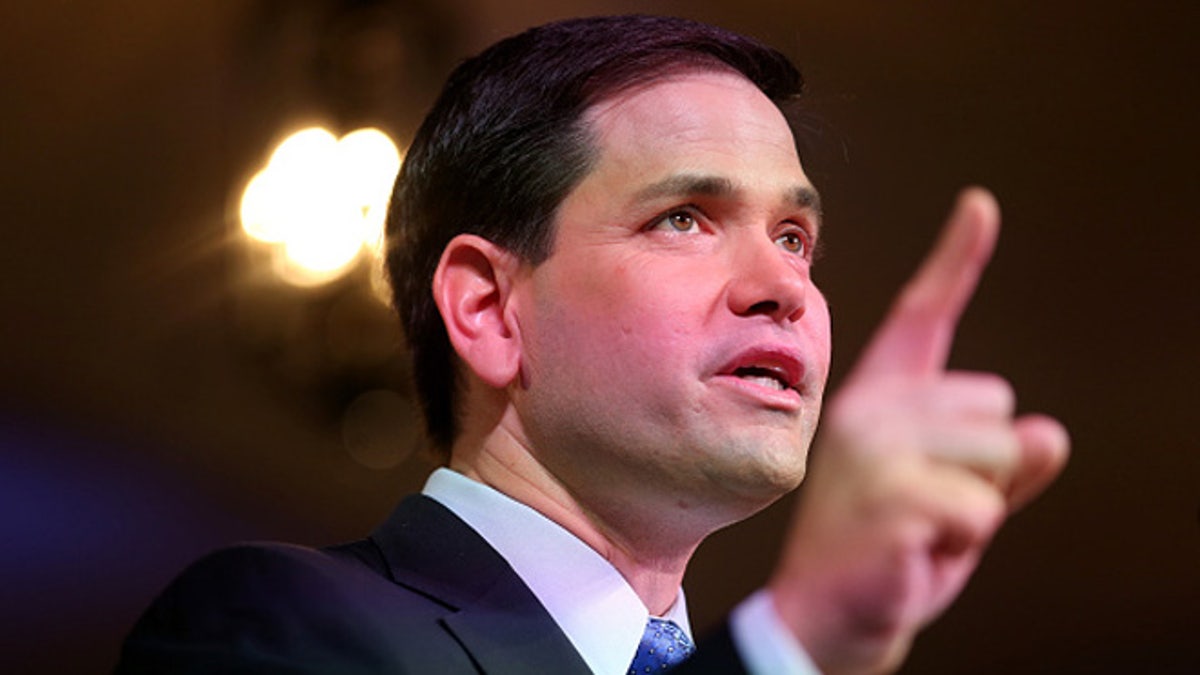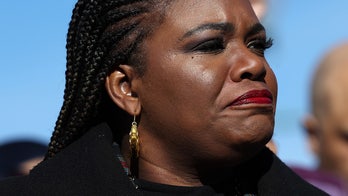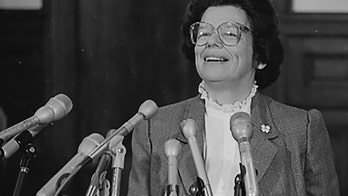
MIAMI, FL - APRIL 13: U.S. Sen. Marco Rubio (R-FL) speaks as he announces his candidacy for the Republican presidential nomination during an event at the Freedom Tower on April 13, 2015 in Miami, Florida. Rubio is one of three Republican candidates to announce their plans on running against the Democratic challenger for the White House. (2015 Getty Images)
Sen. Marco Rubio began his first full day as presidential candidate focused on the Iran nuclear deal, which was fitting given the starring role he is giving foreign policy in his campaign.
The Florida senator swats at questions about his youth and short tenure in Congress with his dealings with foreign policy issues concerning such global hotspots as Iran, Syria, Ukraine, Cuba and Venezuela.
These are the kinds of complex, burning issues, Rubio emphasizes, that as a member of the U.S. Senate he developed expertise in. He contrasts that on-the-job training to the work of governors (read: potential presidential election rivals Jeb Bush and Scott Walker), who have a largely domestic focus.
Rubio made foreign policy his pet topic after a bipartisan comprehensive immigration bill that passed in the Senate, and of which he was a key part, fell apart once it got to the House.
Rubio, who had been the face of the bill – defending and explaining it on TV news shows – found himself the target of criticism by conservatives, his base, who said he was a sell-out for taking part in a measure that sought to give amnesty to undocumented immigrants.
“I think it was a smart pivot for him,” said Erick Erickson, founder of the conservative Red State website. “The 2016 election in large part will be about foreign policy. Republicans, even [Ronald] Reagan in 1980 and [George W.] Bush in 2000, win foreign policy elections more than they do domestic elections.”
“He’s hoping people will forget his immigration compromise,” Erickson said.
Rubio’s theme has been that the United cannot be a wimp in the face of mounting aggression by Venezuela’s socialist government against its own people, and by Russia against Ukraine. He is deadest against a nuclear deal with Iran that would modify sanctions unless it recognizes that Israel has a right to exist.
In a Monday night interview with Fox News’ Sean Hannity, Rubio said: "There should have been a clear recognition on their part that Israel has a right to exist as a Jewish state...This is a country that's made clear that they want to destroy a strong ally of the United States."
Rubio has said that if he is president, he would undo the nuclear agreement as well as diplomatic deals with Cuba, the country his parents left before the Communist revolution. (Wisconsin Gov. Scott Walker, another Republican who is expected to run for president, also has said that he would undo the Iran nuclear deal.)
Fernand Amandi, managing partner at the Bendixen & Amandi International polling firm, doesn’t think Rubio’s foreign policy work in the Senate will get him very far in the presidential election.
“He has not distinguished himself in any real way when it comes to foreign policy,” said Amandi, who is based in Florida. “Rather than a strength, it could be seen as a weakness” by focusing attention on how little impact he has had on foreign policy matters.
Rubio has taken aim at Clinton, saying that as President Barack Obama’s Secretary of State, she was part and parcel of the administration’s checkered foreign policy efforts.
“What is her agenda going to be?” asked Rubio in an interview with Breitbart News, a conservative site. “Is she going to be a continuance of what we have now, which is not what the American people want? What’s the difference between her and the current administration?”
“We’re talking about someone who was this architect of failed foreign policy,” said Rubio.
Linking Clinton with an old foreign policy, Erickson said, is in keeping with “continuing with the theme of her being yesterday’s candidate.”
Erickson said Rubio is less likely to direct criticism of rivals in the presidential race like Cruz, a conservative favorite.
“Rubio will not distinguish himself from Cruz because the most aggressive voters in the primary are conservative voters,” Erickson said, adding that the Florida senator has been trying to redeem himself among the conservatives who backed away from supporting him after the bipartisan immigration bill.
If anything, Erickson said, “It’ll be Cruz who distinguishes himself from Rubio on foreign policy, not Rubio.”
Like us on Facebook




